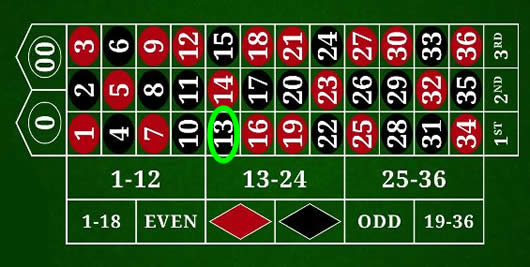While roulette, a game of chance with centuries of history, relies heavily on luck, players' betting decisions can be greatly influenced by their understanding of the odds. The European and the American roulette wheels are the two main varieties. There are 37 numbered pockets on the European wheel, numbered 0 to 36, while click here the American wheel has 38 pockets total, plus a 00 pocket. This difference gives the European wheel a slight advantage, the European wheel has a more advantageous player advantage. Roulette offers players a wide range of betting options. A single number, a particular range of numbers, the color of the pocket (black or red), or whether the number will be odd or even can all be bet on.
Players should familiarize themselves with the odds and potential payouts of each bet type before placing their bets. For instance, betting on a single number offers 35:1 odds, whereas betting on red or black yields 1:1 odds. By understanding the odds of each bet, players can develop more strategic approaches to roulette. Defining Session Boundaries.
Managing your bankroll is vital in roulette to avoid online roulette software exceeding your budget and losing more than you can afford. Establishing session boundaries is a key aspect of bankroll management. Regardless of whether they are winning or losing, players should decide on a budget before they begin and stick to it. Win and Stop-Loss Limitations.
Determining a stop-loss limit—that is, the amount at The original source which a player will leave the table regardless of winning or losing—is another crucial component of managing bankroll. A stop-loss limit helps players avoid losing more than they can afford and prevents impulsive actions during tough times. Taking Charge of the Money.
Gamers should establish a win limit, or the point at which they will leave the table if they are winning, in addition to a stop-loss limit. Setting stop-loss & win limits helps players maintain financial control & prevents them from making rash decisions that could cost them money. Despite being a game of chance, roulette players can employ a few strategies to increase their winnings. The Martingale system, which doubles the wager following each loss, is one well-liked tactic.
The theory underlying this tactic is that the player will eventually recover all of their prior losses when they win. Caution is advised with this strategy since a losing streak can result in substantial financial losses. The D’Alembert system, which involves increasing the stake by one unit after a loss and reducing it by one after a win, is another option. This strategy is based on the idea that wins and losses will eventually balance out, leading to a small profit. Like the Martingale method, players must use caution and set strict limits when using this strategy to prevent suffering large financial losses.
The psychology of gambling plays a crucial role in managing money while playing roulette. Emotions such as excitement, fear, and greed can influence a player’s decision-making, leading to impulsive actions that might result in financial losses. A winning player might become overconfident and take greater risks, which can lead to substantial losses if their luck changes. On the other hand, a losing player might become angry and start chasing losses, trying to win back their money. This can lead to hasty decisions and reckless betting, resulting in even greater financial losses. Players should be mindful of their emotions and take steps to stay in financial control.
This might involve taking regular breaks, setting strict spending limits, and avoiding impulsive decisions. There are a few common mistakes players should avoid when managing their money in roulette. A frequent mistake is failing to set firm spending caps for each session. Without set limits, players could spend more than they can afford, causing financial problems.
Increasing bets to recover losses, known as chasing losses, is another frequent mistake. This should be avoided, as it can lead to significant financial losses. Players should also refrain from acting rashly or in response to negative emotions like fear or greed. This could entail chasing losses during a losing streak or taking greater chances during a winning streak. It’s essential for players to stay disciplined and adhere to their established boundaries, no matter their level of success or failure.
Players can make sure they are in charge of their finances and stay away from big financial losses by avoiding these typical blunders. Limiting yourself & maintaining control.
Whether winning or losing, establishing firm spending caps for each session and adhering to them is crucial for maintaining discipline.


Players should also refrain from drinking alcohol when playing roulette, as it can impair judgment and result in costly rash decisions. Successful Financial Management & Reaching Your Goals.
By maintaining discipline and practicing responsible gambling, players can stay in control of their finances and avoid significant financial losses. To conclude, mastering money management in roulette involves understanding the odds, setting bankroll limits, using effective strategies, understanding gambling psychology, avoiding common mistakes, and practicing discipline and responsible gaming.
Players can boost their chances of winning and avoid substantial financial losses in roulette by following these principles and maintaining discipline.
Important Points
- Understanding the odds is crucial for successful money management in rouletteEstablishing limits and managing your bankroll is vital for long-term success in rouletteApply strategies and tips to enhance your winnings and reduce losses in rouletteUnderstand the psychological impact of emotions on money management in rouletteAvoid typical money management mistakes in roulette to stay disciplined and in control
Common Questions
Understanding Money Management in Roulette
Money management in roulette refers to the strategies and techniques used to effectively manage your betting funds while playing the game. It encompasses setting limits, placing strategic bets, and managing your bankroll to minimize losses and maximize potential profits.
Why Money Management Matters in Roulette
Money management is important in roulette because it helps players maintain control over their betting funds, reduce the risk of significant losses, and prolong their playing time. It also allows players to make more strategic and calculated bets, rather than relying solely on luck.
What are some common money management strategies in roulette?
Typical money management strategies in roulette include budgeting for each session, setting a loss limit, using systems like Martingale or Fibonacci, and making strategic bets based on odds and probabilities.

Mastering Money Management in Roulette
Players can master money management in roulette by educating themselves about the game, understanding the odds and probabilities of different bets, setting clear limits for their bankroll, and sticking to a disciplined betting strategy. It's also important to avoid chasing losses and to know when to walk away from the table.
What are the potential risks of poor money management in roulette?
Poor money management in roulette can result in major financial losses, chasing losses, emotional decision-making, and a negative impact on overall financial health. Additionally, it can cause impulsive and irrational betting, damaging a player's bankroll.